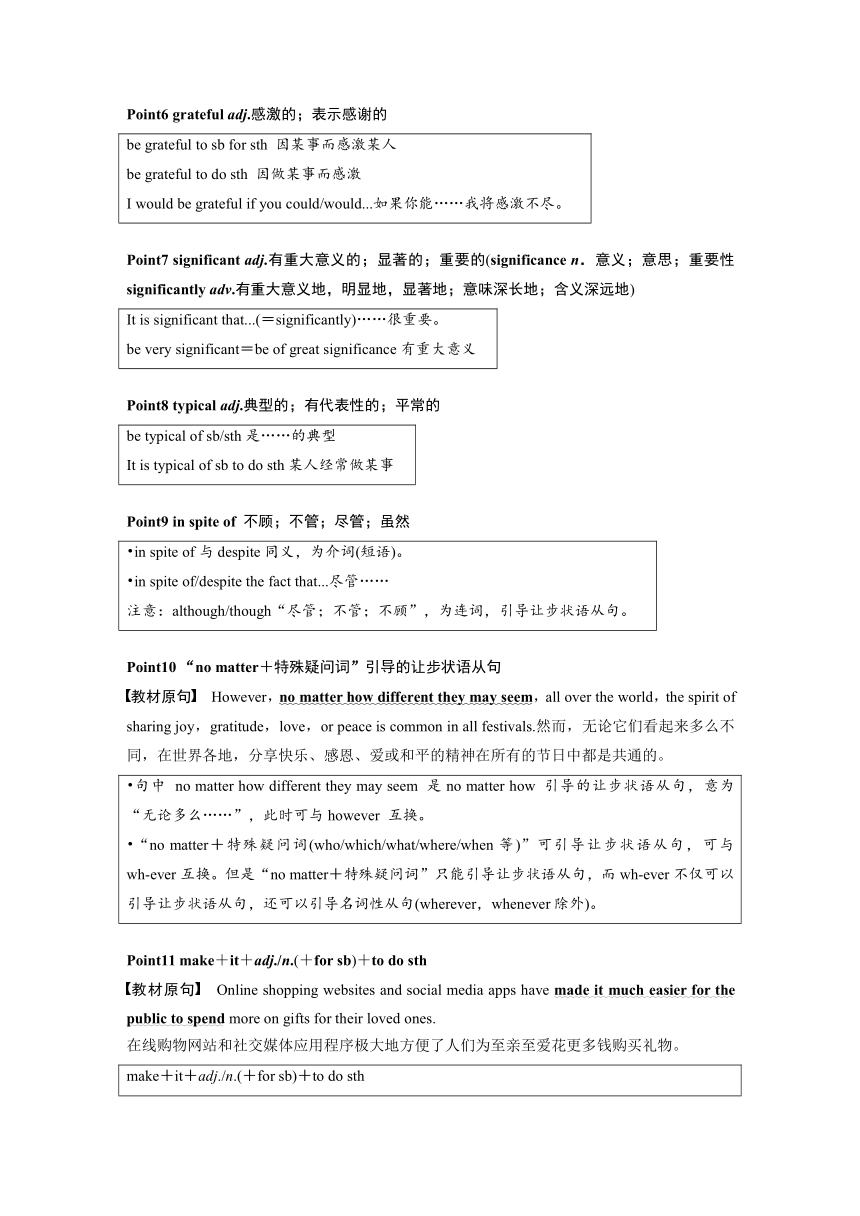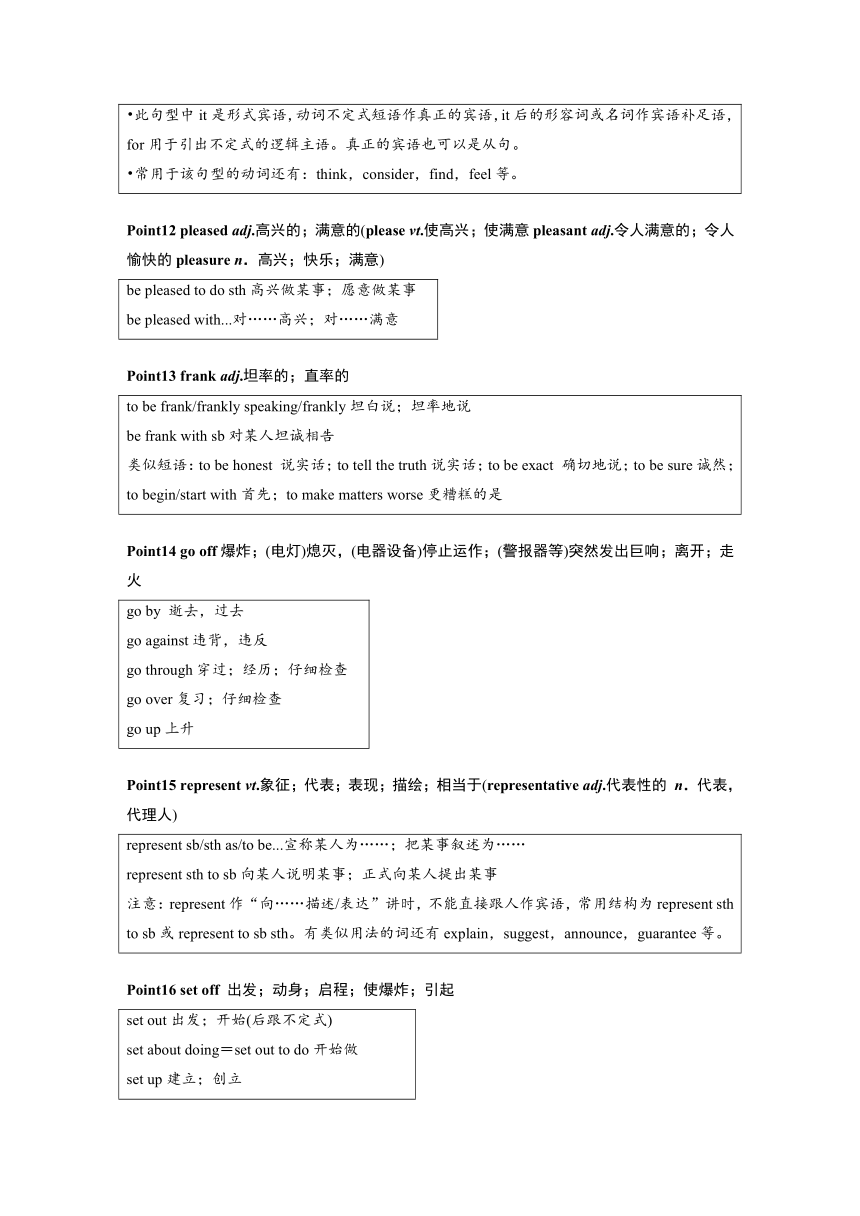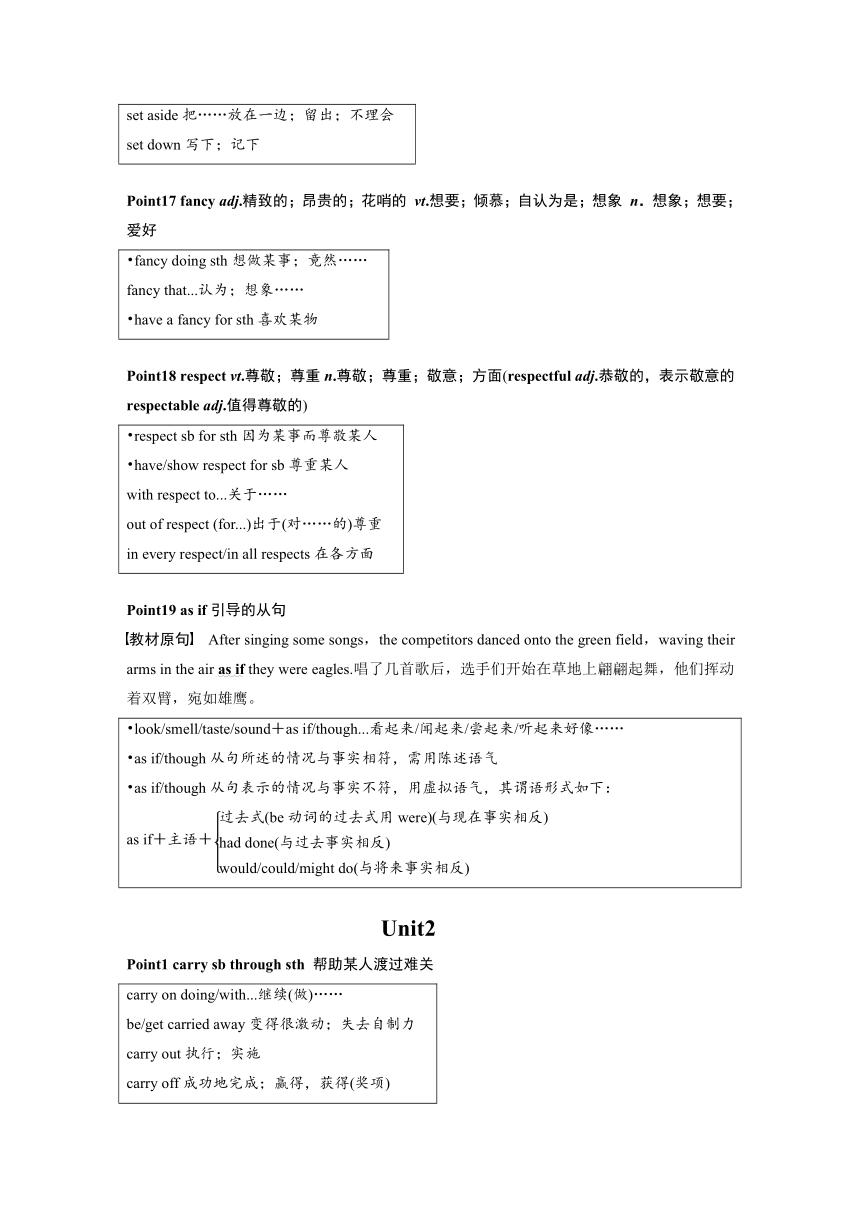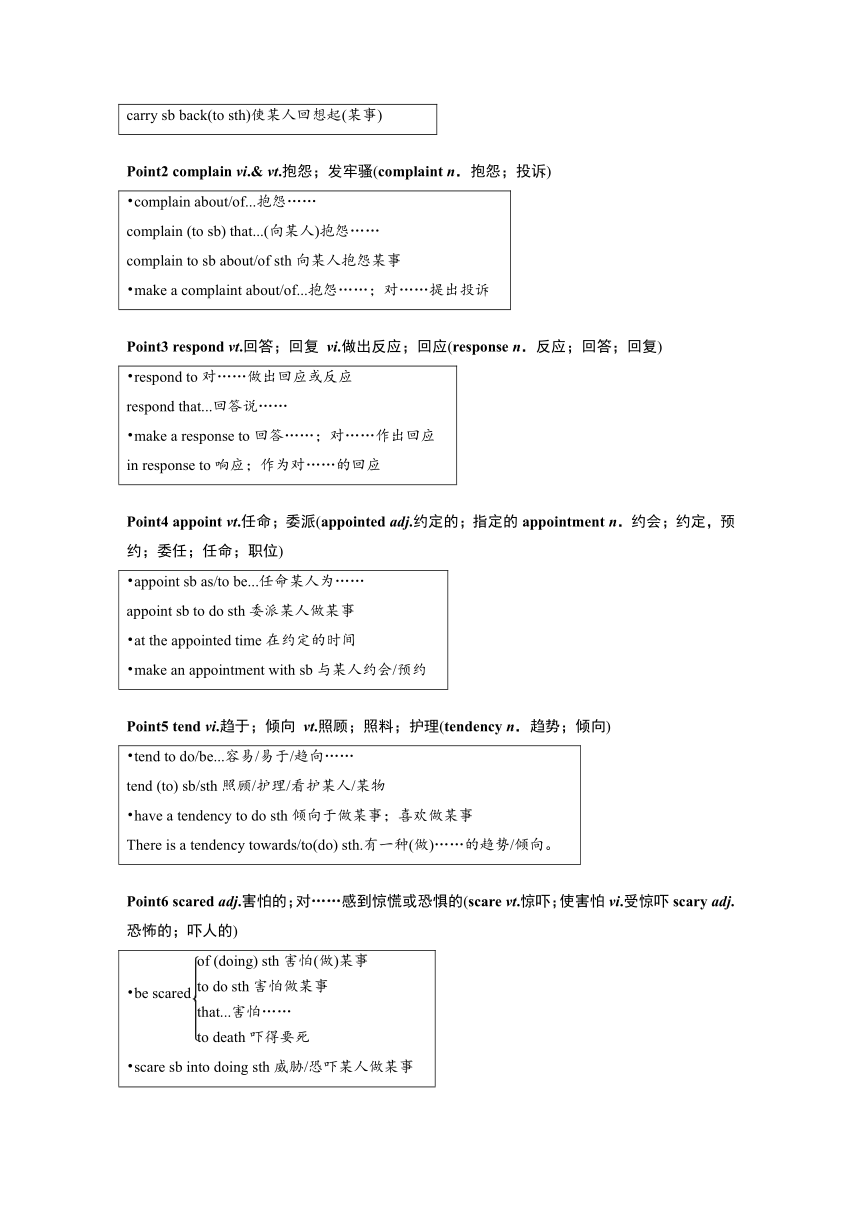2024-2025学年高中英语人教版(2019)必修第三册课本知识点总结 清单(素材)
文档属性
| 名称 | 2024-2025学年高中英语人教版(2019)必修第三册课本知识点总结 清单(素材) |

|
|
| 格式 | docx | ||
| 文件大小 | 65.0KB | ||
| 资源类型 | 教案 | ||
| 版本资源 | 人教版(2019) | ||
| 科目 | 英语 | ||
| 更新时间 | 2025-03-15 12:12:47 | ||
图片预览





文档简介
Unit 1
Point1 dress (sb) up穿上盛装;装扮;装饰;掩饰
dress (oneself) up as...把自己打/装扮成…… get dressed in/dress sb/oneself in穿上(表动作) be dressed in穿着(表状态)
Point2 congratulation n.祝贺;恭喜;(pl.)贺词[congratulate vt.向(某人)道贺;(因某事)为自己感到自豪]
express/offer/send one’s congratulations to sb向某人致以祝贺 Congratulations!(口语)祝贺你! congratulate sb on (doing) sth祝贺某人(做)某事 注意:congratulate“祝贺,道贺”,宾语是指人的名词,不是指物的名词;celebrate“庆祝,庆贺”,宾语往往是表示活动的名词。
Point3 after all 毕竟,终究;别忘了
first of all首先 above all最重要的是;尤其 in all总计 all in all总的来说 at all(否定句)一点也不;(疑问句)到底,究竟
Point4 range n.一系列;范围,界限 vt.& vi.排列;(在一定范围内)变化;包括
a full/wide range of...大范围的……,各种…… in/within the range of...在射程以内;在……范围内 beyond/out of range of...在射程外;在……范围外 range from...to...在……范围内变动;包括从……到……之间
Point5 figure n.画像;雕像;身材,体形;人物;数字;几何图形 v.认为;认定;计算;是……的部分
keep one’s figure保持体形 figure sth in将某事物包括在内;计算在内 figure out想出;弄明白;计算出 figure that...认为……;认定……
Point6 grateful adj.感激的;表示感谢的
be grateful to sb for sth 因某事而感激某人 be grateful to do sth 因做某事而感激 I would be grateful if you could/would...如果你能……我将感激不尽。
Point7 significant adj.有重大意义的;显著的;重要的(significance n.意义;意思;重要性significantly adv.有重大意义地,明显地,显著地;意味深长地;含义深远地)
It is significant that...(=significantly)……很重要。 be very significant=be of great significance有重大意义
Point8 typical adj.典型的;有代表性的;平常的
be typical of sb/sth是……的典型 It is typical of sb to do sth某人经常做某事
Point9 in spite of 不顾;不管;尽管;虽然
in spite of与despite同义,为介词(短语)。 in spite of/despite the fact that...尽管…… 注意:although/though“尽管;不管;不顾”,为连词,引导让步状语从句。
Point10 “no matter+特殊疑问词”引导的让步状语从句
教材原句 However,no matter how different they may seem,all over the world,the spirit of sharing joy,gratitude,love,or peace is common in all festivals.然而,无论它们看起来多么不同,在世界各地,分享快乐、感恩、爱或和平的精神在所有的节日中都是共通的。
句中 no matter how different they may seem 是no matter how 引导的让步状语从句,意为“无论多么……”,此时可与however 互换。 “no matter+特殊疑问词(who/which/what/where/when等)”可引导让步状语从句,可与wh-ever互换。但是“no matter+特殊疑问词”只能引导让步状语从句,而wh-ever不仅可以引导让步状语从句,还可以引导名词性从句(wherever,whenever除外)。
Point11 make+it+adj./n.(+for sb)+to do sth
教材原句 Online shopping websites and social media apps have made it much easier for the public to spend more on gifts for their loved ones.
在线购物网站和社交媒体应用程序极大地方便了人们为至亲至爱花更多钱购买礼物。
make+it+adj./n.(+for sb)+to do sth 此句型中it是形式宾语,动词不定式短语作真正的宾语,it后的形容词或名词作宾语补足语,for用于引出不定式的逻辑主语。真正的宾语也可以是从句。 常用于该句型的动词还有:think,consider,find,feel等。
Point12 pleased adj.高兴的;满意的(please vt.使高兴;使满意pleasant adj.令人满意的;令人愉快的pleasure n.高兴;快乐;满意)
be pleased to do sth高兴做某事;愿意做某事 be pleased with...对……高兴;对……满意
Point13 frank adj.坦率的;直率的
to be frank/frankly speaking/frankly坦白说;坦率地说 be frank with sb对某人坦诚相告 类似短语:to be honest 说实话;to tell the truth说实话;to be exact 确切地说;to be sure诚然;to begin/start with首先;to make matters worse更糟糕的是
Point14 go off爆炸;(电灯)熄灭,(电器设备)停止运作;(警报器等)突然发出巨响;离开;走火
go by 逝去,过去 go against违背,违反 go through穿过;经历;仔细检查 go over复习;仔细检查 go up上升
Point15 represent vt.象征;代表;表现;描绘;相当于(representative adj.代表性的 n.代表,代理人)
represent sb/sth as/to be...宣称某人为……;把某事叙述为…… represent sth to sb向某人说明某事;正式向某人提出某事 注意:represent作“向……描述/表达”讲时,不能直接跟人作宾语,常用结构为represent sth to sb或represent to sb sth。有类似用法的词还有explain,suggest,announce,guarantee等。
Point16 set off 出发;动身;启程;使爆炸;引起
set out出发;开始(后跟不定式) set about doing=set out to do开始做 set up建立;创立 set aside把……放在一边;留出;不理会 set down写下;记下
Point17 fancy adj.精致的;昂贵的;花哨的 vt.想要;倾慕;自认为是;想象 n.想象;想要;爱好
fancy doing sth想做某事;竟然…… fancy that...认为;想象…… have a fancy for sth喜欢某物
Point18 respect vt.尊敬;尊重n.尊敬;尊重;敬意;方面(respectful adj.恭敬的,表示敬意的respectable adj.值得尊敬的)
respect sb for sth因为某事而尊敬某人 have/show respect for sb尊重某人 with respect to...关于…… out of respect (for...)出于(对……的)尊重 in every respect/in all respects在各方面
Point19 as if引导的从句
教材原句 After singing some songs,the competitors danced onto the green field,waving their arms in the air as if they were eagles.唱了几首歌后,选手们开始在草地上翩翩起舞,他们挥动着双臂,宛如雄鹰。
look/smell/taste/sound+as if/though...看起来/闻起来/尝起来/听起来好像…… as if/though从句所述的情况与事实相符,需用陈述语气 as if/though从句表示的情况与事实不符,用虚拟语气,其谓语形式如下: as if+主语+
Unit2
Point1 carry sb through sth 帮助某人渡过难关
carry on doing/with...继续(做)…… be/get carried away变得很激动;失去自制力 carry out执行;实施 carry off成功地完成;赢得,获得(奖项) carry sb back(to sth)使某人回想起(某事)
Point2 complain vi.& vt.抱怨;发牢骚(complaint n.抱怨;投诉)
complain about/of...抱怨…… complain (to sb) that...(向某人)抱怨…… complain to sb about/of sth向某人抱怨某事 make a complaint about/of...抱怨……;对……提出投诉
Point3 respond vt.回答;回复 vi.做出反应;回应(response n.反应;回答;回复)
respond to对……做出回应或反应 respond that...回答说…… make a response to回答……;对……作出回应 in response to响应;作为对……的回应
Point4 appoint vt.任命;委派(appointed adj.约定的;指定的appointment n.约会;约定,预约;委任;任命;职位)
appoint sb as/to be...任命某人为…… appoint sb to do sth委派某人做某事 at the appointed time在约定的时间 make an appointment with sb与某人约会/预约
Point5 tend vi.趋于;倾向 vt.照顾;照料;护理(tendency n.趋势;倾向)
tend to do/be...容易/易于/趋向…… tend (to) sb/sth照顾/护理/看护某人/某物 have a tendency to do sth倾向于做某事;喜欢做某事 There is a tendency towards/to(do) sth.有一种(做)……的趋势/倾向。
Point6 scared adj.害怕的;对……感到惊慌或恐惧的(scare vt.惊吓;使害怕vi.受惊吓scary adj.恐怖的;吓人的)
be scared scare sb into doing sth威胁/恐吓某人做某事 scare sb/sth away/off把某人/物吓跑
Point7 replace vt.接替;取代;更换;把……放回原处(replacement n.替换;更换;替换物;接替者)
replace A with/by B 以B代替/替换A replace sth=take the place of sth代替某物/某事 a replacement for ……的替代品/替补 名师点津 “代替”的其他表达法:in place of;in one’s place;take one’s place;instead of
Point8 nothing(否定词)+形容词比较级+than
教材原句 To a person nothing is more precious than their life.
对一个人来说,没有什么比他们的生命更宝贵的了。
句中“nothing(否定词)+形容词比较级+than”为比较级形式表达最高级意义。 其他表示最高级的句型: ①the+最高级+比较范围 ②can/could+never/not+be+...enough/too...再……也不过分;越……越好 ③比较级+than+
Point9 the+序数词+名词+to do
教材原句 She immediately became the first woman ever to be hired as a resident physician in the OB-GYN department of the PUMC Hospital.她随即成为北京协和医院妇产科聘任的第一位女住院医师。
此句中的不定式to be hired...作后置定语,修饰名词woman。当中心词是序数词或被序数词、形容词最高级等修饰时或前有the only,the last,the right等时,常用动词不定式作后置定语。 在time,way,chance,ability,promise等抽象名词后常用不定式作后置定语。
Point10 感官动词+宾语+宾补
教材原句 At times she was even seen riding a donkey to faraway villages to provide medical care.
有时,人们甚至会看到她骑着毛驴去偏远的乡村给人看病。
本句中含有“see sb doing sth”结构即“感官动词+宾语+宾补”。 可用于该结构的感官动词有:see,hear,smell,feel,watch,notice,observe等。
Point11 assist vt.帮助;协助;援助(assistant n.助手,助理;售货员 adj.副的;助理的assistance n.帮助;援助)
帮助某人做某事 with the assistance of...在……的帮助下 come/go to sb’s assistance来/去帮助某人
Point12 pass away 去世;消失
pass sth down使世代相传;流传 pass...off as...(把某人)改变或冒充成…… pass...on to...把……传递给…… pass by走过;经过(……旁边)
Point13 in memory of 作为对……的纪念
“in+n.+of”型的其他短语: in honour of为纪念…… in need of需要 in praise of赞扬 in charge of负责,管理 in search of寻找
Point14 in tears 流着泪;含着泪
burst into tears突然大哭起来 fight back tears 忍住眼泪 tears of joy喜悦的泪水 be bathed in tears 泪流满面 be moved to tears感动得流泪 hold back one’s tears忍住泪水 be close to tears快流泪了
Point15 harm n.& vt.损害;伤害(harmful adj.有害的harmless adj.无害的;无恶意的)
do sb/sth harm=do harm to sb/sth对……有害 There is no harm (in) doing sth.做某事无害处。 be harmful to对……有害
Point16 a great/good deal of 许多的,大量的(只能修饰不可数名词)
a great/good deal用作副词短语时,可修饰形容词、副词比较级来加强程度,也可以修饰动词作状语。 a great deal用作名词短语时,意为“大量,许多”,在句中作主语或宾语。
Point17 独立主格结构
教材原句 After a while,a group of women came along,each balancing a pot of water on her head.
过了一会儿,一群女人走了过来,每人头上都顶着一罐水。
本句中each balancing a pot of water on her head是由代词each和动词-ing形式短语构成的结构,充当句子的状语,这种语法现象被称作“独立主格结构”。 独立主格基本结构:名词或代词+adj./adv./介词短语/doing/done/to do。
Unit3
Point1 admit v.承认;准许进入(或加入);接纳;可容纳(admission n.承认;供认;入场费;门票费)
be admitted into/to被录取;被接收 admit doing sth/having done sth承认做过某事 admit that...承认…… admit sb/sth to be+adj./n.承认某人/某物(事)为…… be admitted as 被承认为;被接受为
Point2 occur vi.(occurred,occurred,occurrence)发生;出现
某人突然想到…… 表示“某人突然想到……”还常用下列句型: It strikes/struck sb that... It hits/hit sb that...
Point3 head to (朝……)前进;(向……)去
head for/towards 朝……前进 raise one’s head 抬头 shake/nod one’s head 摇头/点头 keep one’s head 保持冷静 lose one’s head 惊慌失措;失去理智 hold one’s head high 昂首挺胸
Point4 seek vt.& vi.(sought,sought) 寻找;寻求;争取;(向人)请求
seek to do sth试图;设法做某事 seek for/after寻找/追求 seek advice from...向……征求意见
Point5 claim vt.& n.夺取(生命);宣称;断言
claim that/to do...声称…… claim to have done sth声称做过某事 It is claimed that...据称…… claim for sth/make a claim for就……提出要求 claim sth back索回某物,要回某物
Point6 escape vi.& vt.逃走;逃脱;避开n.逃跑;逃脱;解脱
escape from...从……逃脱/逃跑 escape (doing) sth避开(做)某事 escape being done sth逃避被做某事 have a narrow escape死里逃生
Point7 bring about 引起;导致;带来
bring up抚养;培养;教育;提出;呕吐 bring down使倒下;减少;降低 bring out出版;使显现 bring in引进;获利;赚钱 bring sth back 使某物恢复;使想起某事
Point8 动词不定式作状语
教材原句 To earn a living,some opened up shops and restaurants in Chinatown.
为了谋生,有些人在唐人街开商店、开餐馆。(P28)
To earn a living在句中作状语,表示目的。不定式(短语)作状语,多表示目的,也表示原因、结果等。表结果时多表示出人意料的结果,常和only连用,构成only to do/only to be done。
Point9 There be+sb/sth+非谓语动词
教材原句 There were so many good cafés and restaurants to choose from.
这里有很多不错的咖啡馆和餐馆可供选择。(P29)
此句中含有动词不定式to choose from,此句为there be 句型中非谓语的使用,主要有以下几种情况: There be sb/sth+ 注意:不定式与被修饰词为被动关系,如不定式中的动词为不及物动词,其后应加介词。
Point10 settle vi.定居;安家;和解 vt.使定居;结束(争论);安排;解决(settlement n.定居点;协议;解决 settler n.移居者;殖民者)
settle down(使)安定;安居;平静下来 settle in/into安顿下来;习惯于;适应 settle down to (doing) sth开始认真(做)某事
Point11 suit vt.适合;满足……需要;对……方便;相配;合身 n.西服;套装(suitable adj.适合的)
suit sb(fine)合某人的意;对某人很合适 suit...to sb/sth使……适合某人/某物 be suitable for sb/sth适合于某人/某物 be suitable to do sth适合做某事
Point12 (at) first hand 第一手;亲自
at hand 在手边;在附近;即将到来;即将发生 by hand用手 hand in hand手拉手;密切关联 on (the) one hand...on the other (hand)...一方面……另一方面…… hand in 提交;交上
Point13 contain vt.包含;含有;容纳;容忍;控制,克制
contain oneself克制自己 container n.容器;集装箱
Point14 what引导的主语从句
教材原句 What started as a residential area for Chinese immigrants then turned into a centre for Chinese culture.这里原本是中国移民的居住地,后来变成一个中国文化中心。
what在此处引导的是主语从句,what在从句中作主语。 what引导名词性从句时,在从句中充当句子成分(主语、表语或宾语)。可以译成多种意思:……的东西或事情;……的人或样子;……的数量或数目;……的时间;……的地方等。 that也可引导名词性从句,但that在从句中不作成分,不必译出。引导宾语从句时可以省略,但引导主语从句、表语从句和同位语从句时不能省略。
Unit4
Point1 succeed vi.成功;继承 vt.接替;继任 {success n.[U]成功,胜利;[C]成功的人(或事) successful adj.成功的successfully adv.成功地}
succeed in doing sth成功做某事 succeed to...继承或接替…… be successful in...在……方面成功
Point2 determined adj.坚决的;有决心的;意志坚定的(determine v.确定;决定;下定决心determination n.决心;决定)
be determined to do sth决心做某事(表示状态) determine to do sth决定做某事(表示动作) determine on/upon(doing) sth决定(做)某事
Point3 disappointed adj.失望的;沮丧的(disappoint vt.使失望/沮丧disappointing adj.令人失望的disappointment n.失望;沮丧)
be disappointed at/by/in/with...对……失望 be disappointed to do sth因做某事而失望 be disappointed that...对……失望 to one’s disappointment令某人失望的是
Point4 desire n.渴望;欲望vt.渴望;期望
(have) a desire to do sth/for sth(有)做……的渴望 desire to do sth渴望做某事 desire sb to do sth想让某人做某事 “desire that+主语+(should+)动词原形”表示“希望……” 注意:desire后的主语从句、宾语从句和同位语从句用虚拟语气,谓语动词用“should+动词原形”,should可以省略。
Point5 carry on继续做,坚持干
carry on with sth继续做某事 carry on doing sth继续做某事 carry out进行;贯彻;执行;实施 carry through帮助……渡过难关;完成,实现
Point6 on board 在船(车、飞机等)上[board n.板;木板;黑板,告示牌;委员会;董事会;伙食;膳食 v.登上船(车、飞机等) aboard adv.& prep.在船(飞机、火车等)上;上船(飞机、火车等) abroad adv.在国外;到国外]
go on board 上船(火车、飞机等) go aboard上船(飞机、火车等) go abroad出国
Point7 independently adv.独立地;自立地(independent adj.独立的;自立的depend vi.依靠)
be independent of不依赖……;独立于……之外 depend on 依赖;信赖;取决于
Point8 in the hope of 抱着……的希望
in the hope that...希望……(that引导同位语从句,进一步补充说明hope的具体内容) hope to do sth/hope that...希望做某事 It is hoped that...大家希望……
Point9 动词不定式作后置定语
教材原句 Afterwards,the USSR focused on sending people into space,and on 12 April 1961,Yuri Gagarin became the first person in the world to go into space.
之后,苏联专注于载人太空飞行。1961年4月12日,尤里·加加林成为世界上进入太空的第一人。
句中动词不定式to go into space作定语,修饰the first person,与the first person之间存在逻辑上的主谓关系。动词不定式作后置定语有以下三种情况: 当中心词是序数词或被序数词修饰时; 当中心词被形容词最高级、the next、the only等修饰时; 位于抽象名词ability,chance,ambition,offer,anxiety,attempt等词之后。
Point10 not only...but (also)...不仅……而且……
教材原句 Despite the difficulties,scientists hope future discoveries will not only enable us to understand how the universe began,but also help us survive well into the future.尽管困难重重,科学家们希望未来的发现不仅能让我们了解宇宙的起源,还能让人类延续生存,直到未来。
本句中的not only...but also...意为“不仅……而且……”,连接两个并列成分。其用法如下: not only...but(also)...连接的两个并列成分作主语时,谓语动词的人称和数遵循“就近原则”。 not only...but(also)...连接两个并列分句,且not only位于句首时,not only后的分句需用部分倒装,but(also)后的分句不倒装。 not only B but also A=A as well as B,两者强调的都是A。
Point11 lack n.缺乏;短缺 vt.缺乏;没有(lacking adj.缺少的,不足的)
(a) lack of缺乏…… for/through lack of因缺少…… lack sth缺乏某物 be lacking in sth在……方面缺乏
Point12 beyond prep.在更远处;超出
beyond description难以形容 beyond control失去控制 beyond repair无法修理 beyond belief难以置信 beyond the reach of/beyond one’s reach超出……的范围 beyond recognition认不出来 beyond sb对某人来说难以理解;对某人来说很难处理 beyond one’s power 超出某人的权力
Point13 argue v.争论;辩论;讨论;论证(argument n.争论;争辩;争吵;论点)
argue with sb about/over sth因某事与某人争吵/争论 argue for/against赞成/反对…… argue that...主张……,认为…… argue sb into/out of doing sth说服某人做/不做某事 have an argument with sb about/over sth就某事与某人争吵/争论
Point14 result in 产生,导致;造成
result from由于;由……造成 as a result结果,因此,所以 as a result of作为……的结果;因为……
Point15 limited adj.有限的(limit vt.限制;限定 n.界限;限度limitless adj.无限制的)
be limited to...受限制于…… limit...to...把……限定在……之内 There is a/no limit to...……是有限的/无限的。 set a limit/limits on设定……的限度 without limit无限地,无限制地
Point16 provide for 提供生活所需
给某人提供某物
Point17 用光;耗尽(物作主语,无被动语态)
run out of用光,用完(人作主语,有被动语态) run across偶然遇到 run after追逐;追求 run into撞上;遇上,偶然遇到;碰上(困境、麻烦等) 名师点津 run out表示“用完,耗尽”,不及物,相当于give out;而run out of 及物,相当于use up。
Point18 attach vt.系;绑;贴;(使)附属;(使)隶属(attached adj.附着的;依恋的attachment n.附件;喜爱;连接)
attach...to...把……系/绑/贴在……上 attach importance/value to认为……重要/有价值;重视 be attached to 依恋;附属于;爱慕
Point19 动词-ing形式作主语
教材原句 Firstly,exploring space has already made a difference in the fight against world hunger.
首先,太空探索已经在对抗世界饥饿的斗争中发挥了作用。
句中的exploring space是动词-ing形式作主语。其用法如下: 单个的动词-ing形式作主语,谓语动词用单数; 用it作形式主语,动词-ing形式后置作真正的主语。常用于“It is no use doing...”“It is no good doing...”“It is fun doing...”“It is a waste of time doing...”等句型中; 动词-ing形式的复合结构作主语。当动词-ing形式有自己的逻辑主语时,常在前面加上一个名词或代词的所有格作动词-ing形式的逻辑主语,构成动词-ing形式的复合结构。
Unit5
Point1 basis n.基础;根据;基点(base n.基础;根基;底座 v.以……为基础;根据basic adj.基础的;基本的)
on the basis of在某事的基础上;根据某事 on a regular basis定期地 base...on/upon...把……建立在……的基础上 be based on/upon...以……为基础
Point2 apologise(also apologize) vi.道歉;谢罪(apology n.道歉)
apologise to sb for sth因为某事向某人道歉 make an apology to sb for sth 因为某事向某人道歉 owe sb an apology应向某人道歉
Point3 in return 作为回报;作为回应
in return for...作为……的交换;作为……的报答 in turn轮流;依次;反过来 by turns轮流;时而……时而……
Point4 judge vt.& vi.评价;评判;判断 n.法官;审判员;裁判员[judg(e)ment n.判断力;审判,判决]
judge from/by根据……来判断 as far as I can judge据我判断;在我看来 judge...from/by...从……来判断…… make a judg(e)ment on对……进行评价
Point5 spot vt.看见;注意到;发现 n.地点;处所;斑点;污迹
on the spot当场;立即;在现场 spot sb doing sth发现某人正在做某事 be spotted with...满是…… 名师点津 spot表示地点意义时,其后接定语从句可以使用关系副词where或in which来引导。
Point6 patience n.耐心;忍耐力;毅力(patient adj.耐心的 n.病人patiently adv.有耐心地impatiently adv.没有耐心地)
have little/no patience with...对……几乎没有/没有耐心 have the patience to do sth有耐心做某事 lose patience with对……失去耐心 with patience=patiently耐心地 be patient with对……有耐心
Point7 to be honest=honestly speaking 说实话;坦率地说
to be honest作为插入语,多置于句首,且用逗号与句子的其他部分隔开。可用作插入语的动词不定式短语还有: to tell (you) the truth说实话 to be frank=frankly speaking坦率地说 to be exact=exactly speaking确切地说 to make matters worse更糟糕的是
Point8 be about to do sth即将或正要(做某事)
be about to do...when...=be on the point of doing...when...正要做……这时…… be doing...when...正在做……这时…… have just/hardly/scarcely done...when...刚做完……这时…… 点拨:以上句式中when用作并列连词,意为“这时”。
Point9 postpone vt.延迟;延期;延缓(+to/until...)
postpone doing sth延迟做某事 postpone=put off=delay延期;推迟
Point10 find的复合结构
教材原句 About a month ago,I was sailing,and towards night I found myself carried out to sea by a strong wind.大约一个月前,我开船出海,傍晚时,一阵大风把我刮到了海上。
本句中使用了“find+宾语+宾语补足语”结构。宾语补足语可以由名词、形容词、副词、介词短语、现在分词、过去分词和动词不定式等充当。有此用法的动词还有see,hear,leave,make,get,have等。
Point11 It is/was...that/who...强调句型
教材原句 And it was the ship that brought you to England.这么说,是这艘船把你带到了英国。
本句为强调句型,强调的是主语。 强调句型的一般结构为:It is/was+被强调部分+that/who+其他。 强调句型的一般疑问句结构为:Is/Was it+被强调部分+who/that... 强调句型的特殊疑问句结构为:特殊疑问词+is/was it that...?(强调句型的特殊疑问句只能强调特殊疑问词) not until的强调句结构为:It is/was not until...that...。 判断强调句型的方法:将强调结构“It is/was...that/who...”去掉,如果句子结构仍然完整,则是强调句型,否则就不是。
Point12 hesitate v.犹豫;迟疑;顾虑(hesitation n.犹豫;迟疑)
hesitate about/over/at(doing)对(做)……感到犹豫 hesitate to do sth迟疑做某事,不愿做某事 without hesitation毫不犹豫 have no hesitation in doing sth毫不犹豫地做某事
Point13 manner n.举止;行为方式;方法;[pl.]礼貌;礼仪
in a…manner用一种……的方式;带着一副……的样子 table manners餐桌礼仪 it is good/bad manners to do sth做某事是有/没有礼貌的
Point14 option n.可选择的事物;选择;选择权(optional adj.可选择的;选修的)
have no option but to(do) 除了(做)……以外别无选择,只好 optional/selective subjects选修课 compulsory/required subjects必修课
Point15 broad adj.宽阔的;广阔的;广泛的(broaden vt.变宽;增长)
with a broad smile 咧嘴笑着 broaden one’s horizons/view 拓宽某人的视野 broaden/increase one’s knowledge 扩充某人的知识
Point16 normal adj.典型的;正常的;一般的;精神正常的 n.常态;通常标准;一般水平(abnormal adj.不正常的;反常的)
It is normal (for sb) to do sth(对某人来说)做某事是正常的 above/below normal通常标准之上/之下
Point17 willing adj.愿意;乐意(willingly adv.乐意地unwilling adj.不愿意的;勉强的willingness n.乐意;心甘情愿)
be willing to do sth愿意或乐意做某事 be unwilling to do sth不愿意做某事
Point18 permission n.准许;许可;批准;许可证(permit vt.& vi.允许,准许,使有可能 n.许可证;执照,通行证)
ask sb for permission=ask permission from sb请求某人许可 with/without (one’s) permission 得到/未经(某人的)允许 permit sb to do sth允许某人做某事 permit (doing) sth允许(做)某事
名师点津 动词permit的常见用法:permit sb to do sth/permit doing sth,根据汉语提示写出用法类似的动词。
forbid doing/sb to do sth 禁止(某人)做某事 encourage doing/sb to do sth 鼓励(某人)做某事
advise doing/sb to do sth 建议(某人)做某事 allow doing/sb to do sth 允许(某人)做某事
Point19 否定副词位于句首引起的部分倒装
教材原句 I remember thinking that never would I hold such a note as this...我记得当时我还在想,我这一辈子都不可能摸到这样一张钞票……
当含有否定意义的词或短语位于句首时,句子需用部分倒装语序,即:否定词+助动词/情态动词/be+主语。 这样的词或短语有: 全部否定意义副词:never/not/neither/nor/nowhere 部分否定意义副词:hardly/scarcely/rarely/seldom/little “绝不”短语:at no time/by no means/in no case/in no way/on no condition/on no account
Point20 get done结构
教材原句 You would have to wait a long time to get paid.你得等很久才能拿到钱。
本句中的get paid是get done 结构,表示被动,着重强调动作的发生。 常见的get done结构: get punished受到惩罚 get hurt受到伤害 get married结婚 get annoyed生气 get excited激动 get separated被分开;走散
Point1 dress (sb) up穿上盛装;装扮;装饰;掩饰
dress (oneself) up as...把自己打/装扮成…… get dressed in/dress sb/oneself in穿上(表动作) be dressed in穿着(表状态)
Point2 congratulation n.祝贺;恭喜;(pl.)贺词[congratulate vt.向(某人)道贺;(因某事)为自己感到自豪]
express/offer/send one’s congratulations to sb向某人致以祝贺 Congratulations!(口语)祝贺你! congratulate sb on (doing) sth祝贺某人(做)某事 注意:congratulate“祝贺,道贺”,宾语是指人的名词,不是指物的名词;celebrate“庆祝,庆贺”,宾语往往是表示活动的名词。
Point3 after all 毕竟,终究;别忘了
first of all首先 above all最重要的是;尤其 in all总计 all in all总的来说 at all(否定句)一点也不;(疑问句)到底,究竟
Point4 range n.一系列;范围,界限 vt.& vi.排列;(在一定范围内)变化;包括
a full/wide range of...大范围的……,各种…… in/within the range of...在射程以内;在……范围内 beyond/out of range of...在射程外;在……范围外 range from...to...在……范围内变动;包括从……到……之间
Point5 figure n.画像;雕像;身材,体形;人物;数字;几何图形 v.认为;认定;计算;是……的部分
keep one’s figure保持体形 figure sth in将某事物包括在内;计算在内 figure out想出;弄明白;计算出 figure that...认为……;认定……
Point6 grateful adj.感激的;表示感谢的
be grateful to sb for sth 因某事而感激某人 be grateful to do sth 因做某事而感激 I would be grateful if you could/would...如果你能……我将感激不尽。
Point7 significant adj.有重大意义的;显著的;重要的(significance n.意义;意思;重要性significantly adv.有重大意义地,明显地,显著地;意味深长地;含义深远地)
It is significant that...(=significantly)……很重要。 be very significant=be of great significance有重大意义
Point8 typical adj.典型的;有代表性的;平常的
be typical of sb/sth是……的典型 It is typical of sb to do sth某人经常做某事
Point9 in spite of 不顾;不管;尽管;虽然
in spite of与despite同义,为介词(短语)。 in spite of/despite the fact that...尽管…… 注意:although/though“尽管;不管;不顾”,为连词,引导让步状语从句。
Point10 “no matter+特殊疑问词”引导的让步状语从句
教材原句 However,no matter how different they may seem,all over the world,the spirit of sharing joy,gratitude,love,or peace is common in all festivals.然而,无论它们看起来多么不同,在世界各地,分享快乐、感恩、爱或和平的精神在所有的节日中都是共通的。
句中 no matter how different they may seem 是no matter how 引导的让步状语从句,意为“无论多么……”,此时可与however 互换。 “no matter+特殊疑问词(who/which/what/where/when等)”可引导让步状语从句,可与wh-ever互换。但是“no matter+特殊疑问词”只能引导让步状语从句,而wh-ever不仅可以引导让步状语从句,还可以引导名词性从句(wherever,whenever除外)。
Point11 make+it+adj./n.(+for sb)+to do sth
教材原句 Online shopping websites and social media apps have made it much easier for the public to spend more on gifts for their loved ones.
在线购物网站和社交媒体应用程序极大地方便了人们为至亲至爱花更多钱购买礼物。
make+it+adj./n.(+for sb)+to do sth 此句型中it是形式宾语,动词不定式短语作真正的宾语,it后的形容词或名词作宾语补足语,for用于引出不定式的逻辑主语。真正的宾语也可以是从句。 常用于该句型的动词还有:think,consider,find,feel等。
Point12 pleased adj.高兴的;满意的(please vt.使高兴;使满意pleasant adj.令人满意的;令人愉快的pleasure n.高兴;快乐;满意)
be pleased to do sth高兴做某事;愿意做某事 be pleased with...对……高兴;对……满意
Point13 frank adj.坦率的;直率的
to be frank/frankly speaking/frankly坦白说;坦率地说 be frank with sb对某人坦诚相告 类似短语:to be honest 说实话;to tell the truth说实话;to be exact 确切地说;to be sure诚然;to begin/start with首先;to make matters worse更糟糕的是
Point14 go off爆炸;(电灯)熄灭,(电器设备)停止运作;(警报器等)突然发出巨响;离开;走火
go by 逝去,过去 go against违背,违反 go through穿过;经历;仔细检查 go over复习;仔细检查 go up上升
Point15 represent vt.象征;代表;表现;描绘;相当于(representative adj.代表性的 n.代表,代理人)
represent sb/sth as/to be...宣称某人为……;把某事叙述为…… represent sth to sb向某人说明某事;正式向某人提出某事 注意:represent作“向……描述/表达”讲时,不能直接跟人作宾语,常用结构为represent sth to sb或represent to sb sth。有类似用法的词还有explain,suggest,announce,guarantee等。
Point16 set off 出发;动身;启程;使爆炸;引起
set out出发;开始(后跟不定式) set about doing=set out to do开始做 set up建立;创立 set aside把……放在一边;留出;不理会 set down写下;记下
Point17 fancy adj.精致的;昂贵的;花哨的 vt.想要;倾慕;自认为是;想象 n.想象;想要;爱好
fancy doing sth想做某事;竟然…… fancy that...认为;想象…… have a fancy for sth喜欢某物
Point18 respect vt.尊敬;尊重n.尊敬;尊重;敬意;方面(respectful adj.恭敬的,表示敬意的respectable adj.值得尊敬的)
respect sb for sth因为某事而尊敬某人 have/show respect for sb尊重某人 with respect to...关于…… out of respect (for...)出于(对……的)尊重 in every respect/in all respects在各方面
Point19 as if引导的从句
教材原句 After singing some songs,the competitors danced onto the green field,waving their arms in the air as if they were eagles.唱了几首歌后,选手们开始在草地上翩翩起舞,他们挥动着双臂,宛如雄鹰。
look/smell/taste/sound+as if/though...看起来/闻起来/尝起来/听起来好像…… as if/though从句所述的情况与事实相符,需用陈述语气 as if/though从句表示的情况与事实不符,用虚拟语气,其谓语形式如下: as if+主语+
Unit2
Point1 carry sb through sth 帮助某人渡过难关
carry on doing/with...继续(做)…… be/get carried away变得很激动;失去自制力 carry out执行;实施 carry off成功地完成;赢得,获得(奖项) carry sb back(to sth)使某人回想起(某事)
Point2 complain vi.& vt.抱怨;发牢骚(complaint n.抱怨;投诉)
complain about/of...抱怨…… complain (to sb) that...(向某人)抱怨…… complain to sb about/of sth向某人抱怨某事 make a complaint about/of...抱怨……;对……提出投诉
Point3 respond vt.回答;回复 vi.做出反应;回应(response n.反应;回答;回复)
respond to对……做出回应或反应 respond that...回答说…… make a response to回答……;对……作出回应 in response to响应;作为对……的回应
Point4 appoint vt.任命;委派(appointed adj.约定的;指定的appointment n.约会;约定,预约;委任;任命;职位)
appoint sb as/to be...任命某人为…… appoint sb to do sth委派某人做某事 at the appointed time在约定的时间 make an appointment with sb与某人约会/预约
Point5 tend vi.趋于;倾向 vt.照顾;照料;护理(tendency n.趋势;倾向)
tend to do/be...容易/易于/趋向…… tend (to) sb/sth照顾/护理/看护某人/某物 have a tendency to do sth倾向于做某事;喜欢做某事 There is a tendency towards/to(do) sth.有一种(做)……的趋势/倾向。
Point6 scared adj.害怕的;对……感到惊慌或恐惧的(scare vt.惊吓;使害怕vi.受惊吓scary adj.恐怖的;吓人的)
be scared scare sb into doing sth威胁/恐吓某人做某事 scare sb/sth away/off把某人/物吓跑
Point7 replace vt.接替;取代;更换;把……放回原处(replacement n.替换;更换;替换物;接替者)
replace A with/by B 以B代替/替换A replace sth=take the place of sth代替某物/某事 a replacement for ……的替代品/替补 名师点津 “代替”的其他表达法:in place of;in one’s place;take one’s place;instead of
Point8 nothing(否定词)+形容词比较级+than
教材原句 To a person nothing is more precious than their life.
对一个人来说,没有什么比他们的生命更宝贵的了。
句中“nothing(否定词)+形容词比较级+than”为比较级形式表达最高级意义。 其他表示最高级的句型: ①the+最高级+比较范围 ②can/could+never/not+be+...enough/too...再……也不过分;越……越好 ③比较级+than+
Point9 the+序数词+名词+to do
教材原句 She immediately became the first woman ever to be hired as a resident physician in the OB-GYN department of the PUMC Hospital.她随即成为北京协和医院妇产科聘任的第一位女住院医师。
此句中的不定式to be hired...作后置定语,修饰名词woman。当中心词是序数词或被序数词、形容词最高级等修饰时或前有the only,the last,the right等时,常用动词不定式作后置定语。 在time,way,chance,ability,promise等抽象名词后常用不定式作后置定语。
Point10 感官动词+宾语+宾补
教材原句 At times she was even seen riding a donkey to faraway villages to provide medical care.
有时,人们甚至会看到她骑着毛驴去偏远的乡村给人看病。
本句中含有“see sb doing sth”结构即“感官动词+宾语+宾补”。 可用于该结构的感官动词有:see,hear,smell,feel,watch,notice,observe等。
Point11 assist vt.帮助;协助;援助(assistant n.助手,助理;售货员 adj.副的;助理的assistance n.帮助;援助)
帮助某人做某事 with the assistance of...在……的帮助下 come/go to sb’s assistance来/去帮助某人
Point12 pass away 去世;消失
pass sth down使世代相传;流传 pass...off as...(把某人)改变或冒充成…… pass...on to...把……传递给…… pass by走过;经过(……旁边)
Point13 in memory of 作为对……的纪念
“in+n.+of”型的其他短语: in honour of为纪念…… in need of需要 in praise of赞扬 in charge of负责,管理 in search of寻找
Point14 in tears 流着泪;含着泪
burst into tears突然大哭起来 fight back tears 忍住眼泪 tears of joy喜悦的泪水 be bathed in tears 泪流满面 be moved to tears感动得流泪 hold back one’s tears忍住泪水 be close to tears快流泪了
Point15 harm n.& vt.损害;伤害(harmful adj.有害的harmless adj.无害的;无恶意的)
do sb/sth harm=do harm to sb/sth对……有害 There is no harm (in) doing sth.做某事无害处。 be harmful to对……有害
Point16 a great/good deal of 许多的,大量的(只能修饰不可数名词)
a great/good deal用作副词短语时,可修饰形容词、副词比较级来加强程度,也可以修饰动词作状语。 a great deal用作名词短语时,意为“大量,许多”,在句中作主语或宾语。
Point17 独立主格结构
教材原句 After a while,a group of women came along,each balancing a pot of water on her head.
过了一会儿,一群女人走了过来,每人头上都顶着一罐水。
本句中each balancing a pot of water on her head是由代词each和动词-ing形式短语构成的结构,充当句子的状语,这种语法现象被称作“独立主格结构”。 独立主格基本结构:名词或代词+adj./adv./介词短语/doing/done/to do。
Unit3
Point1 admit v.承认;准许进入(或加入);接纳;可容纳(admission n.承认;供认;入场费;门票费)
be admitted into/to被录取;被接收 admit doing sth/having done sth承认做过某事 admit that...承认…… admit sb/sth to be+adj./n.承认某人/某物(事)为…… be admitted as 被承认为;被接受为
Point2 occur vi.(occurred,occurred,occurrence)发生;出现
某人突然想到…… 表示“某人突然想到……”还常用下列句型: It strikes/struck sb that... It hits/hit sb that...
Point3 head to (朝……)前进;(向……)去
head for/towards 朝……前进 raise one’s head 抬头 shake/nod one’s head 摇头/点头 keep one’s head 保持冷静 lose one’s head 惊慌失措;失去理智 hold one’s head high 昂首挺胸
Point4 seek vt.& vi.(sought,sought) 寻找;寻求;争取;(向人)请求
seek to do sth试图;设法做某事 seek for/after寻找/追求 seek advice from...向……征求意见
Point5 claim vt.& n.夺取(生命);宣称;断言
claim that/to do...声称…… claim to have done sth声称做过某事 It is claimed that...据称…… claim for sth/make a claim for就……提出要求 claim sth back索回某物,要回某物
Point6 escape vi.& vt.逃走;逃脱;避开n.逃跑;逃脱;解脱
escape from...从……逃脱/逃跑 escape (doing) sth避开(做)某事 escape being done sth逃避被做某事 have a narrow escape死里逃生
Point7 bring about 引起;导致;带来
bring up抚养;培养;教育;提出;呕吐 bring down使倒下;减少;降低 bring out出版;使显现 bring in引进;获利;赚钱 bring sth back 使某物恢复;使想起某事
Point8 动词不定式作状语
教材原句 To earn a living,some opened up shops and restaurants in Chinatown.
为了谋生,有些人在唐人街开商店、开餐馆。(P28)
To earn a living在句中作状语,表示目的。不定式(短语)作状语,多表示目的,也表示原因、结果等。表结果时多表示出人意料的结果,常和only连用,构成only to do/only to be done。
Point9 There be+sb/sth+非谓语动词
教材原句 There were so many good cafés and restaurants to choose from.
这里有很多不错的咖啡馆和餐馆可供选择。(P29)
此句中含有动词不定式to choose from,此句为there be 句型中非谓语的使用,主要有以下几种情况: There be sb/sth+ 注意:不定式与被修饰词为被动关系,如不定式中的动词为不及物动词,其后应加介词。
Point10 settle vi.定居;安家;和解 vt.使定居;结束(争论);安排;解决(settlement n.定居点;协议;解决 settler n.移居者;殖民者)
settle down(使)安定;安居;平静下来 settle in/into安顿下来;习惯于;适应 settle down to (doing) sth开始认真(做)某事
Point11 suit vt.适合;满足……需要;对……方便;相配;合身 n.西服;套装(suitable adj.适合的)
suit sb(fine)合某人的意;对某人很合适 suit...to sb/sth使……适合某人/某物 be suitable for sb/sth适合于某人/某物 be suitable to do sth适合做某事
Point12 (at) first hand 第一手;亲自
at hand 在手边;在附近;即将到来;即将发生 by hand用手 hand in hand手拉手;密切关联 on (the) one hand...on the other (hand)...一方面……另一方面…… hand in 提交;交上
Point13 contain vt.包含;含有;容纳;容忍;控制,克制
contain oneself克制自己 container n.容器;集装箱
Point14 what引导的主语从句
教材原句 What started as a residential area for Chinese immigrants then turned into a centre for Chinese culture.这里原本是中国移民的居住地,后来变成一个中国文化中心。
what在此处引导的是主语从句,what在从句中作主语。 what引导名词性从句时,在从句中充当句子成分(主语、表语或宾语)。可以译成多种意思:……的东西或事情;……的人或样子;……的数量或数目;……的时间;……的地方等。 that也可引导名词性从句,但that在从句中不作成分,不必译出。引导宾语从句时可以省略,但引导主语从句、表语从句和同位语从句时不能省略。
Unit4
Point1 succeed vi.成功;继承 vt.接替;继任 {success n.[U]成功,胜利;[C]成功的人(或事) successful adj.成功的successfully adv.成功地}
succeed in doing sth成功做某事 succeed to...继承或接替…… be successful in...在……方面成功
Point2 determined adj.坚决的;有决心的;意志坚定的(determine v.确定;决定;下定决心determination n.决心;决定)
be determined to do sth决心做某事(表示状态) determine to do sth决定做某事(表示动作) determine on/upon(doing) sth决定(做)某事
Point3 disappointed adj.失望的;沮丧的(disappoint vt.使失望/沮丧disappointing adj.令人失望的disappointment n.失望;沮丧)
be disappointed at/by/in/with...对……失望 be disappointed to do sth因做某事而失望 be disappointed that...对……失望 to one’s disappointment令某人失望的是
Point4 desire n.渴望;欲望vt.渴望;期望
(have) a desire to do sth/for sth(有)做……的渴望 desire to do sth渴望做某事 desire sb to do sth想让某人做某事 “desire that+主语+(should+)动词原形”表示“希望……” 注意:desire后的主语从句、宾语从句和同位语从句用虚拟语气,谓语动词用“should+动词原形”,should可以省略。
Point5 carry on继续做,坚持干
carry on with sth继续做某事 carry on doing sth继续做某事 carry out进行;贯彻;执行;实施 carry through帮助……渡过难关;完成,实现
Point6 on board 在船(车、飞机等)上[board n.板;木板;黑板,告示牌;委员会;董事会;伙食;膳食 v.登上船(车、飞机等) aboard adv.& prep.在船(飞机、火车等)上;上船(飞机、火车等) abroad adv.在国外;到国外]
go on board 上船(火车、飞机等) go aboard上船(飞机、火车等) go abroad出国
Point7 independently adv.独立地;自立地(independent adj.独立的;自立的depend vi.依靠)
be independent of不依赖……;独立于……之外 depend on 依赖;信赖;取决于
Point8 in the hope of 抱着……的希望
in the hope that...希望……(that引导同位语从句,进一步补充说明hope的具体内容) hope to do sth/hope that...希望做某事 It is hoped that...大家希望……
Point9 动词不定式作后置定语
教材原句 Afterwards,the USSR focused on sending people into space,and on 12 April 1961,Yuri Gagarin became the first person in the world to go into space.
之后,苏联专注于载人太空飞行。1961年4月12日,尤里·加加林成为世界上进入太空的第一人。
句中动词不定式to go into space作定语,修饰the first person,与the first person之间存在逻辑上的主谓关系。动词不定式作后置定语有以下三种情况: 当中心词是序数词或被序数词修饰时; 当中心词被形容词最高级、the next、the only等修饰时; 位于抽象名词ability,chance,ambition,offer,anxiety,attempt等词之后。
Point10 not only...but (also)...不仅……而且……
教材原句 Despite the difficulties,scientists hope future discoveries will not only enable us to understand how the universe began,but also help us survive well into the future.尽管困难重重,科学家们希望未来的发现不仅能让我们了解宇宙的起源,还能让人类延续生存,直到未来。
本句中的not only...but also...意为“不仅……而且……”,连接两个并列成分。其用法如下: not only...but(also)...连接的两个并列成分作主语时,谓语动词的人称和数遵循“就近原则”。 not only...but(also)...连接两个并列分句,且not only位于句首时,not only后的分句需用部分倒装,but(also)后的分句不倒装。 not only B but also A=A as well as B,两者强调的都是A。
Point11 lack n.缺乏;短缺 vt.缺乏;没有(lacking adj.缺少的,不足的)
(a) lack of缺乏…… for/through lack of因缺少…… lack sth缺乏某物 be lacking in sth在……方面缺乏
Point12 beyond prep.在更远处;超出
beyond description难以形容 beyond control失去控制 beyond repair无法修理 beyond belief难以置信 beyond the reach of/beyond one’s reach超出……的范围 beyond recognition认不出来 beyond sb对某人来说难以理解;对某人来说很难处理 beyond one’s power 超出某人的权力
Point13 argue v.争论;辩论;讨论;论证(argument n.争论;争辩;争吵;论点)
argue with sb about/over sth因某事与某人争吵/争论 argue for/against赞成/反对…… argue that...主张……,认为…… argue sb into/out of doing sth说服某人做/不做某事 have an argument with sb about/over sth就某事与某人争吵/争论
Point14 result in 产生,导致;造成
result from由于;由……造成 as a result结果,因此,所以 as a result of作为……的结果;因为……
Point15 limited adj.有限的(limit vt.限制;限定 n.界限;限度limitless adj.无限制的)
be limited to...受限制于…… limit...to...把……限定在……之内 There is a/no limit to...……是有限的/无限的。 set a limit/limits on设定……的限度 without limit无限地,无限制地
Point16 provide for 提供生活所需
给某人提供某物
Point17 用光;耗尽(物作主语,无被动语态)
run out of用光,用完(人作主语,有被动语态) run across偶然遇到 run after追逐;追求 run into撞上;遇上,偶然遇到;碰上(困境、麻烦等) 名师点津 run out表示“用完,耗尽”,不及物,相当于give out;而run out of 及物,相当于use up。
Point18 attach vt.系;绑;贴;(使)附属;(使)隶属(attached adj.附着的;依恋的attachment n.附件;喜爱;连接)
attach...to...把……系/绑/贴在……上 attach importance/value to认为……重要/有价值;重视 be attached to 依恋;附属于;爱慕
Point19 动词-ing形式作主语
教材原句 Firstly,exploring space has already made a difference in the fight against world hunger.
首先,太空探索已经在对抗世界饥饿的斗争中发挥了作用。
句中的exploring space是动词-ing形式作主语。其用法如下: 单个的动词-ing形式作主语,谓语动词用单数; 用it作形式主语,动词-ing形式后置作真正的主语。常用于“It is no use doing...”“It is no good doing...”“It is fun doing...”“It is a waste of time doing...”等句型中; 动词-ing形式的复合结构作主语。当动词-ing形式有自己的逻辑主语时,常在前面加上一个名词或代词的所有格作动词-ing形式的逻辑主语,构成动词-ing形式的复合结构。
Unit5
Point1 basis n.基础;根据;基点(base n.基础;根基;底座 v.以……为基础;根据basic adj.基础的;基本的)
on the basis of在某事的基础上;根据某事 on a regular basis定期地 base...on/upon...把……建立在……的基础上 be based on/upon...以……为基础
Point2 apologise(also apologize) vi.道歉;谢罪(apology n.道歉)
apologise to sb for sth因为某事向某人道歉 make an apology to sb for sth 因为某事向某人道歉 owe sb an apology应向某人道歉
Point3 in return 作为回报;作为回应
in return for...作为……的交换;作为……的报答 in turn轮流;依次;反过来 by turns轮流;时而……时而……
Point4 judge vt.& vi.评价;评判;判断 n.法官;审判员;裁判员[judg(e)ment n.判断力;审判,判决]
judge from/by根据……来判断 as far as I can judge据我判断;在我看来 judge...from/by...从……来判断…… make a judg(e)ment on对……进行评价
Point5 spot vt.看见;注意到;发现 n.地点;处所;斑点;污迹
on the spot当场;立即;在现场 spot sb doing sth发现某人正在做某事 be spotted with...满是…… 名师点津 spot表示地点意义时,其后接定语从句可以使用关系副词where或in which来引导。
Point6 patience n.耐心;忍耐力;毅力(patient adj.耐心的 n.病人patiently adv.有耐心地impatiently adv.没有耐心地)
have little/no patience with...对……几乎没有/没有耐心 have the patience to do sth有耐心做某事 lose patience with对……失去耐心 with patience=patiently耐心地 be patient with对……有耐心
Point7 to be honest=honestly speaking 说实话;坦率地说
to be honest作为插入语,多置于句首,且用逗号与句子的其他部分隔开。可用作插入语的动词不定式短语还有: to tell (you) the truth说实话 to be frank=frankly speaking坦率地说 to be exact=exactly speaking确切地说 to make matters worse更糟糕的是
Point8 be about to do sth即将或正要(做某事)
be about to do...when...=be on the point of doing...when...正要做……这时…… be doing...when...正在做……这时…… have just/hardly/scarcely done...when...刚做完……这时…… 点拨:以上句式中when用作并列连词,意为“这时”。
Point9 postpone vt.延迟;延期;延缓(+to/until...)
postpone doing sth延迟做某事 postpone=put off=delay延期;推迟
Point10 find的复合结构
教材原句 About a month ago,I was sailing,and towards night I found myself carried out to sea by a strong wind.大约一个月前,我开船出海,傍晚时,一阵大风把我刮到了海上。
本句中使用了“find+宾语+宾语补足语”结构。宾语补足语可以由名词、形容词、副词、介词短语、现在分词、过去分词和动词不定式等充当。有此用法的动词还有see,hear,leave,make,get,have等。
Point11 It is/was...that/who...强调句型
教材原句 And it was the ship that brought you to England.这么说,是这艘船把你带到了英国。
本句为强调句型,强调的是主语。 强调句型的一般结构为:It is/was+被强调部分+that/who+其他。 强调句型的一般疑问句结构为:Is/Was it+被强调部分+who/that... 强调句型的特殊疑问句结构为:特殊疑问词+is/was it that...?(强调句型的特殊疑问句只能强调特殊疑问词) not until的强调句结构为:It is/was not until...that...。 判断强调句型的方法:将强调结构“It is/was...that/who...”去掉,如果句子结构仍然完整,则是强调句型,否则就不是。
Point12 hesitate v.犹豫;迟疑;顾虑(hesitation n.犹豫;迟疑)
hesitate about/over/at(doing)对(做)……感到犹豫 hesitate to do sth迟疑做某事,不愿做某事 without hesitation毫不犹豫 have no hesitation in doing sth毫不犹豫地做某事
Point13 manner n.举止;行为方式;方法;[pl.]礼貌;礼仪
in a…manner用一种……的方式;带着一副……的样子 table manners餐桌礼仪 it is good/bad manners to do sth做某事是有/没有礼貌的
Point14 option n.可选择的事物;选择;选择权(optional adj.可选择的;选修的)
have no option but to(do) 除了(做)……以外别无选择,只好 optional/selective subjects选修课 compulsory/required subjects必修课
Point15 broad adj.宽阔的;广阔的;广泛的(broaden vt.变宽;增长)
with a broad smile 咧嘴笑着 broaden one’s horizons/view 拓宽某人的视野 broaden/increase one’s knowledge 扩充某人的知识
Point16 normal adj.典型的;正常的;一般的;精神正常的 n.常态;通常标准;一般水平(abnormal adj.不正常的;反常的)
It is normal (for sb) to do sth(对某人来说)做某事是正常的 above/below normal通常标准之上/之下
Point17 willing adj.愿意;乐意(willingly adv.乐意地unwilling adj.不愿意的;勉强的willingness n.乐意;心甘情愿)
be willing to do sth愿意或乐意做某事 be unwilling to do sth不愿意做某事
Point18 permission n.准许;许可;批准;许可证(permit vt.& vi.允许,准许,使有可能 n.许可证;执照,通行证)
ask sb for permission=ask permission from sb请求某人许可 with/without (one’s) permission 得到/未经(某人的)允许 permit sb to do sth允许某人做某事 permit (doing) sth允许(做)某事
名师点津 动词permit的常见用法:permit sb to do sth/permit doing sth,根据汉语提示写出用法类似的动词。
forbid doing/sb to do sth 禁止(某人)做某事 encourage doing/sb to do sth 鼓励(某人)做某事
advise doing/sb to do sth 建议(某人)做某事 allow doing/sb to do sth 允许(某人)做某事
Point19 否定副词位于句首引起的部分倒装
教材原句 I remember thinking that never would I hold such a note as this...我记得当时我还在想,我这一辈子都不可能摸到这样一张钞票……
当含有否定意义的词或短语位于句首时,句子需用部分倒装语序,即:否定词+助动词/情态动词/be+主语。 这样的词或短语有: 全部否定意义副词:never/not/neither/nor/nowhere 部分否定意义副词:hardly/scarcely/rarely/seldom/little “绝不”短语:at no time/by no means/in no case/in no way/on no condition/on no account
Point20 get done结构
教材原句 You would have to wait a long time to get paid.你得等很久才能拿到钱。
本句中的get paid是get done 结构,表示被动,着重强调动作的发生。 常见的get done结构: get punished受到惩罚 get hurt受到伤害 get married结婚 get annoyed生气 get excited激动 get separated被分开;走散
